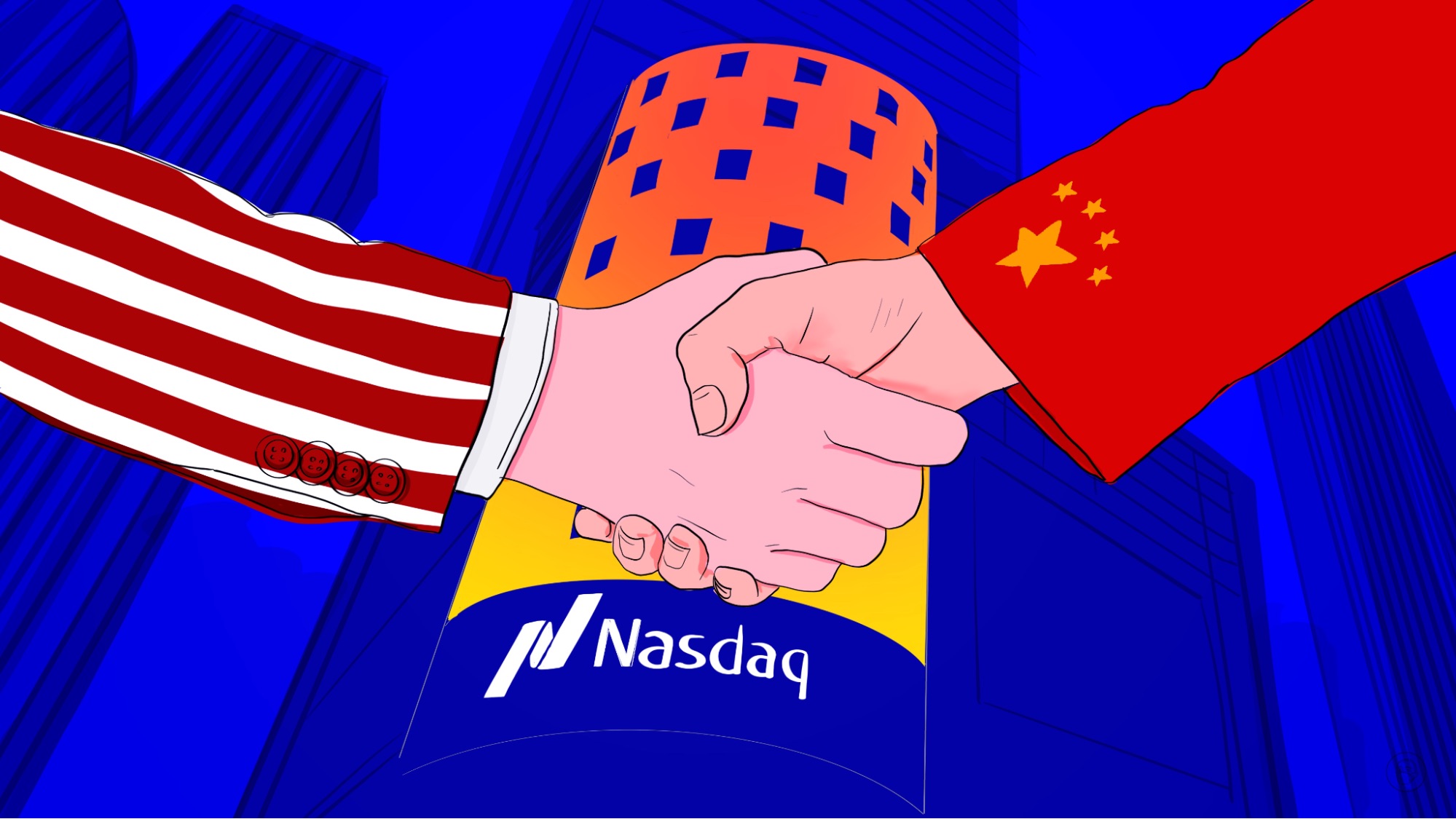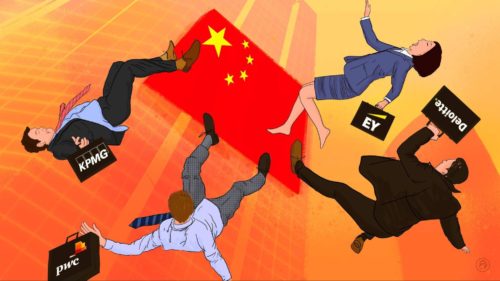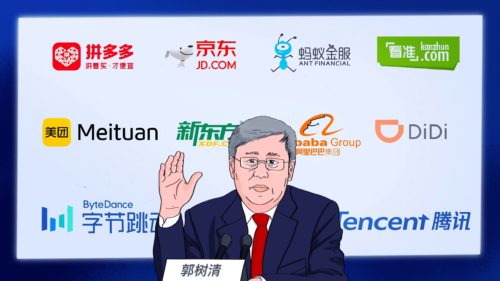Why the U.S. and China might broker a deal on U.S. capital access
Despite mounting bilateral tensions, capital flows may be one area the U.S. and China can find common ground.

Despite tensions over Taiwan, export controls, and sanctions, there are some areas where the U.S.-China relationship may find agreement. With the anticipated arrival of U.S. auditors in Beijing — denied by U.S. officials, but still likely to happen soon — a decade-long tug-of-war about the conditions Chinese firms must meet to list on U.S. capital markets may be reaching its denouement.
China has been the lone holdout of a review process — established in 2002 as part of what’s known as the Sarbanes-Oxley Act — that subjects newly listed firms to auditing in order to protect investors from fraud. The principal players in the drama — China Securities Regulatory Commission (CSRC), the U.S. Securities and Exchange Commission (SEC), and the Public Company Accounting Oversight Board (PCAOB) — are currently engaged in a detailed negotiation.
Pressure has mounted over the past two years, as Congress pushed forward the Holding Foreign Companies Accountable Act (HFCAA), which set a three-year timeline to delist audit-dodging firms. Earlier this year, the SEC began listing at-risk Chinese firms: they include big Chinese tech players like Baidu, Tencent, and Alibaba, and budding EV players such as Li Auto. On May 4, the SEC added 80 more to the delisting notice, including JD.com, Pinduoduo, NetEase, and Bilibili.
A complex regulatory landscape
Why, ostensibly, are the two sides working toward a solution? The motivations are complex.
Since 2020, there has been a broad consensus among U.S. regulators and policymakers that Chinese audit-dodging is unfair and unsustainable. Congress’s passing of the HFCAA put a timer on the issue. Similar concerns have mounted over the financial structure used by many Chinese firms to list in the U.S., known as the variable interest entity (VIE) structure. Finally, China’s cybersecurity reviews against ride-hailing giant Didi caused serious heartburn in U.S. financial regulatory circles. These concerns were aired in a novel tweet by SEC Chairman Gary Gensler last August that included a cute video animation of how the VIE structure worked, featuring a cartoon turtle. In the current geopolitical climate, it has become intolerable for Chinese firms to list in the U.S. under conditions that do not align with international best practices.
I believe that China-based companies that want to raise capital from American investors should disclose more of the information we need to make informed investment decisions. pic.twitter.com/EoGihzKTDN
— Gary Gensler (@GaryGensler) August 16, 2021
Compounding the complexity of the agreement is also the U.S. regulatory bureaucracy. While the PCAOB, for example, is overseen by the SEC, it remains a separate agency chartered by Congress. To reach an agreement with the CSRC, the SEC and PCAOB’s appointed boards both have to agree that any agreement was up to snuff. But in reality, it is the PCAOB that has the lead role in working out the detailed arrangements for conducting audits, as PCAOB officials will actually conduct the inspections.
Meanwhile, Beijing’s political landscape is equally complicated. In the past few years, there has been a major uptick in listings on China’s domestic markets, prompted by U.S. delistings and tech companies eager to hedge their bets. While boosting domestic capital markets goes a long way in advancing Beijing’s self-sufficiency goals, the recent developments have also strained the domestic markets: officials are worried markets may not have the maturity, liquidity, and oversight resources to handle such an influx of Chinese firms.
This may make the prospect of China’s largest tech companies — many of which are key investors in new “hard” and “core” technologies of high priority for Beijing — being expelled from Western capital markets too steep a cost. To add to the mix, the Chinese interagency is now exponentially more complex than it was a decade ago when the issue first came to the fore. The CSRC is the lead decision-maker, but the Ministry of Finance (MoF) regulates the domestic audit industry. In addition, other Chinese agencies like the Ministry of State Security (MSS) and the Ministry of Justice (MOJ) have some jurisdiction, as does the increasingly assertive Cyberspace Administration of China (CAC). CAC launched the cybersecurity review of Didi, and wants a say in all decisions around data transfers, including data that Chinese companies would be required to share with U.S. auditors.
In a positive sign, Vice Premier Liú Hè 刘鹤, China’s chief economic czar, noted in mid-March that talks on the auditing issue were making progress and that both sides were moving toward specific plans for working out an agreement. This suggested that the issue is being addressed by China’s top brass. However, Liu does not oversee the CAC or the MSS, which are under the firm control of the Party.
On the U.S. side, the decision will be made at the level of the regulators, not at the level of the White House. There will likely not be a high-level interagency meeting on this issue, for example, where a more political spin might be put on the decision. In the current highly charged bilateral environment, that is a positive factor that suggests that a deal is more likely to be struck that is satisfactory to regulators and stabilizes markets.
Toward a solution
The initial team of U.S. auditors that will likely touch down in Beijing soon will take some time over the summer to do a series of trial audits to get real data on whether Chinese authorities are serious about resolving the issue. Initial reports late last week that a team had already arrived were denied by PCAOB; the potential for an extended lockdown may have deterred the team from coming, but the plan to move forward almost certainly includes a series of visits to obtain ground truth on how audits will be allowed to be conducted. Last month, Chinese regulators signaled to companies including Alibaba to prepare for an auditing process, suggesting Beijing is ready to move forward with trial audits. Still, any agreement would likely not be announced until after the U.S. midterm elections in November.
Significantly, this process is the only area where U.S. and Chinese officials are meeting regularly and trying to resolve a tough issue in the relationship, and some observers have been surprised by the fact that the Biden administration, which has taken a hardline approach to China, is “allowing” this. It appears likely that the Treasury Department has convinced the White House that this is a good idea, with the alternative — no deal and delisting pressure mounting — being bad for both sides, global markets, and economic growth. The Biden administration will likely do nothing positive on engagement with China before the November elections, almost certainly pushing any agreement to later in the year.
Finally, like what happened with Didi, Beijing may still determine that some listed firms — those with more sensitive data and geopolitical issues swirling around them — may need to delist to make the deal possible, particularly to satisfy other parts of the Chinese security apparatus. A CSRC statement following Didi’s announcement claimed that Didi’s decision had nothing to do with efforts to resolve the auditing dispute, but the link is clearly there. Expect a small number of other companies to take the same path, in order to preserve, at least for the moment, Chinese access to U.S. markets.
It is still possible that Congress will pass further measures to limit Chinese access, including adding more companies to the NS-CMIC list or requiring the SEC to take a harder look at the VIE structure. If that happens, 2023 could be a year of renewed pressure on decoupling in financial markets, but regulators on both sides will still proceed with caution amid the buffeting of geopolitical winds.






